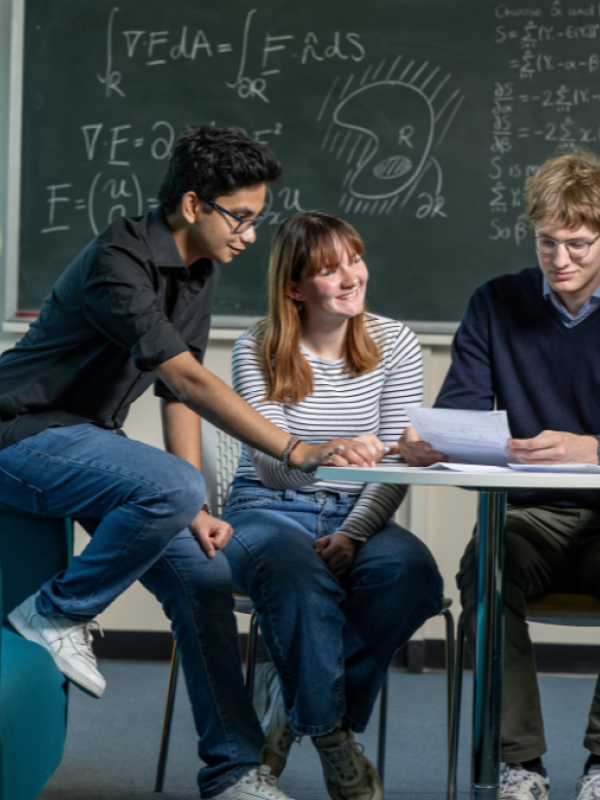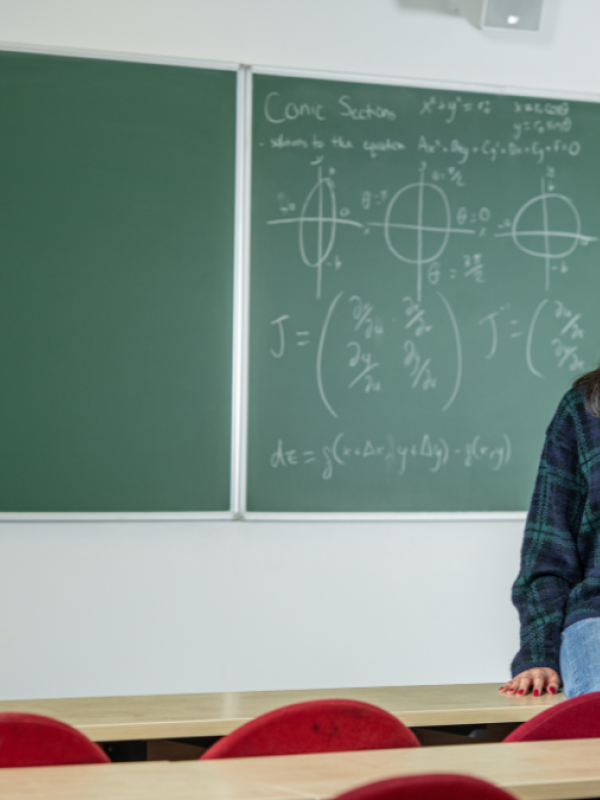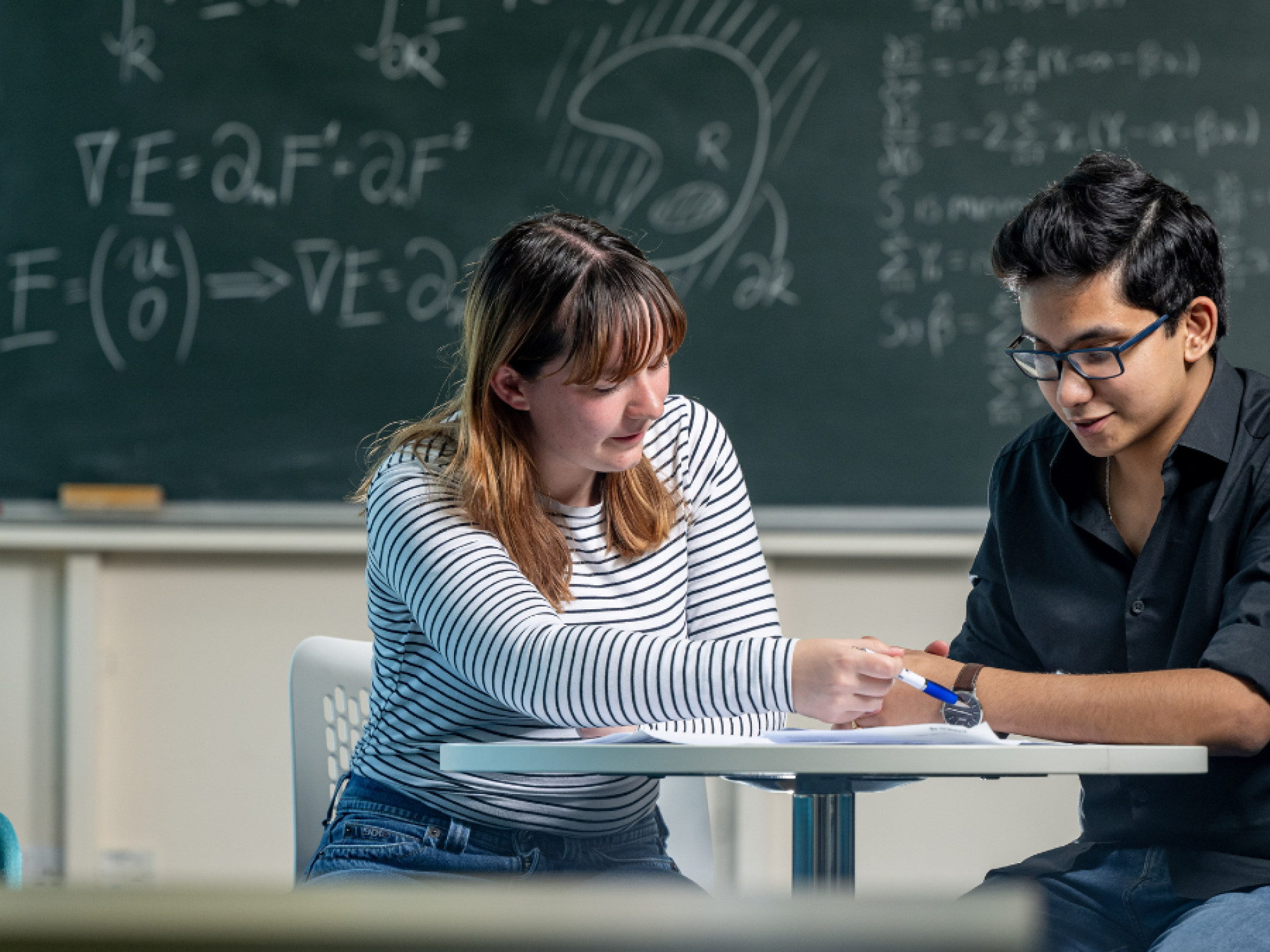
- Mathematics with Data Science
BSc (Hons) — 2026 entry Mathematics with Data Science
Our mathematics and data science degrees can prepare you for a huge variety of exciting career paths including healthcare, finance, environment and sustainability, government, tech, transport, marketing, education, entertainment and performance analytics.
4,161+ people have created a bespoke digital prospectus
Why choose
this course?
Encompassing the latest advances in mathematics for data science, our courses give you a strong foundation in core mathematics including equations and classical dynamics, while you can explore a wide range of optional modules including quantum mechanics and the mathematics of weather and climate.
- Get industry-ready with our award-winning Professional Training placements - our maths students have placed at organisations like the National Physical Laboratory and the Defence Science and Technology Laboratory.
- You’ll develop transferable skills such as creative problem-solving and logical reasoning, which are always in great demand in a wide range of career sectors.
- As a mathematics undergraduate at Surrey, you’ll be part of a vibrant and friendly community including the Maths Society and Maths and Statistics Advice (MASA) team. You’ll benefit from a personal tutor, small group teaching, and a lively, research-active learning environment.
Statistics
94%
Of Surrey undergraduates are in work or further study within 15 months of graduating (Graduate Outcomes 2025, HESA)
15th in the UK
For overall student satisfaction* in the National Student Survey 2025.
*Measured by % positivity based on Q1-24 for all institutions listed in the Guardian University Guide league tables.

What you will study
Our mathematics with data science courses help you build on your current knowledge and gain a strong foundation across the fundamentals of mathematics, data science and statistics. This includes algebra, analysis, probability and advanced calculus. Data science and statistics modules together comprise between one-quarter and one-third of the programme.
In your first year, you'll learn the fundamental role of mathematics for data science, develop your mathematical programming skills using Python (which will be further developed in Year 2) and gain experience with R programming.
In Year 3, you’ll be able to choose from a broad range of optional modules in topics such as experimental design, asset pricing theory, mathematical theory of data science, Bayesian statistics, and graphs and networks.
Professional recognition
BSc (Hons) - Institute of Mathematics and its Applications (IMA)
This programme will meet the educational requirements of the Chartered Mathematician designation, awarded by the Institute of Mathematics and its Applications, when it is followed by subsequent training and experience in employment to obtain equivalent competences to those specified by the Quality Assurance Agency (QAA) for taught masters degrees.
Foundation year
If you don’t meet our entry requirements, you might still be able to apply for this degree with a Mathematics and Computer Science Foundation Year. This is an extra year of study to develop your skills and make it easier for you to get started at university. On successful completion of your foundation year, you’ll be ready to progress to the first year of your BSc Mathematics with Data Science degree.
To see what modules you’ll be studying, refer to the foundation tab in the 'course structure' section.
The academic year is divided into two semesters of 15 weeks each. Each semester consists of a period of teaching, revision/directed learning and assessment.
The structure of our programmes follow clear educational aims that are tailored to each programme. These are all outlined in the programme specifications which include further details such as the learning outcomes.
- Mathematics with Data Science BSc (Hons)
- Mathematics with Data Science BSc (Hons) with foundation year
- Mathematics with Data Science BSc (Hons) with placement
- Mathematics with Data Science BSc (Hons) with foundation year and placement
Please note: The full module listing for the optional Professional Training placement part of your course is available in the relevant programme specification.
Modules
Modules listed are indicative, reflecting the information available at the time of publication. Modules are subject to teaching availability, student demand and/or class size caps.
The University operates a credit framework for all taught programmes based on a 15-credit tariff.
Course options
Year 1 - BSc (Hons)
Semester 1
Compulsory
This module introduces students to the most important techniques in Calculus. In particular, the module leads to a deeper understanding of the concepts of differentiation and integration. These concepts provide fundamental tools for quantitative descriptions of the real world across the entirety of applied mathematics. Tools and methods for differentiation and integration will be presented in detail. In addition, simple first and second order ordinary differential equations will be studied. Such equations have important applications for interpreting and understanding the world around us.
View full module detailsThis module combines an introduction to abstract algebra and methods of proof, with an introduction to vectors and matrices with applications to algebraic and geometric problems. This module is fundamental to subsequent modules including MAT1034 Linear Algebra and MAT2048 Groups & Rings.
View full module detailsThis module is an introduction to analysis, which is the branch of mathematics that rigorously studies functions, continuity and limit processes, such as differentiation and integration. The module leads, among other things, to a deeper understanding of what it means for a sequence or series to converge. Tools such as convergence tests are presented and their validity proved, and the rigorous use of definitions and logic play a central role. This course lays the foundations for the Level 5 module in Real Analysis 2 (MAT2004) in particular, and, more generally, underpins other modules where a culture of rigorous proof exists.
View full module detailsProbability is a numerical description of random events, and statistics is the science of collecting and analysing data from these random events and modelling them with random variables. Students will be introduced to the basic concepts of probability distributions, hypothesis testing and random variables. These concepts are fundamental in probability and statistics and lay the foundations for Level 5 Mathematical Statistics (MAT2013), Linear Statistical Methods (MAT2053) and Stochastic Processes (MAT2003). Students will also be introduced to programming in the statistical software R, and thus gain employability through enhancing their digital capabilities.
View full module detailsSemester 2
Compulsory
This module is an introduction to Linear Algebra, a fundamental mathematical discipline that revolves around the exploration of vector spaces as well as linear maps between these spaces. This often necessitates the solution of systems of linear equations, which are elegantly described by matrices and vectors. Techniques from Linear Algebra find application in numerous disciplines ranging from pure and applied mathematics to many fields of science, engineering, computing and economics. This module builds on MAT1031: Algebra and provides a foundation for a variety of subsequent modules, including MAT2009 Operations Research and Optimisation, MAT2047 Curves and Surfaces, MAT2048 Groups & Rings, MAT3004 Introduction to Function Spaces and MAT3039 Quantum Mechanics.
View full module detailsMuch of the way that mathematicians model the physical world today relies on the mathematical framework set out by Newton in the 17th century. In this module, we take as our starting point Newton’s laws of motion and examine how they may be applied to study the dynamics of particles and mechanical systems. This module provides a foundation for MAT3008 Lagrangian and Hamiltonian Dynamics.
View full module detailsThis module introduces basic mathematical programming in Python and professional skills. The module covers digital skills such as basic data handling, processing and least squares fitting to analyze real-world problems. The professional skills cover employability, teamworking, writing a technical report, and presentation skills. The goal of the module is to equip students with the skills to tackle real-world problems, communicate their results and prepare them for employment after their degree.
View full module detailsThis module introduces students to Multivariable Calculus in two and three dimensions, and selected topics such as differential operators and line integrals in Vector Calculus. This extends students’ knowledge developed in MAT1030 Calculus on differentiation and integration of single variable functions to partial differentiation, and double and triple integration of two and three-variable functions. This module provides the necessary ground work for modules such as MAT2047 Curves and Surfaces, MAT2050 Inviscid Fluid Dynamics, and MAT2054 Functions of a Complex Variable.
View full module detailsYear 2 - BSc (Hons)
Semester 1
Compulsory
This module builds on the differential equation aspects of the Level 4 modules Calculus and Linear Algebra and considers qualitative and quantitative aspects of Ordinary Differential Equations.
View full module detailsThis module introduces a variety of commonly used techniques from Operations Research. The module leads to a deeper understanding of linear programming problems and the theory that underpins their solving. Tools such as the Simplex Method are presented and an introduction to nonlinear optimisation methods is also provided. This module supports and complements other modules where optimisation and constrained optimisation are considered.
View full module detailsOptional
Analysis is the branch of mathematics that rigorously studies functions, continuity, differentiability and integration. This module builds on Level 4 Real Analysis 1 (MAT1032) by studying these concepts in a more formal way and hence provides a deeper understanding of these concepts.
View full module detailsStatistics is the science of collecting and analysing data from random events and modelling them using random variables. This module first recaps the properties of a single random variable as seen in Level 4 Probability and Statistics (MAT1033), then builds on this by considering multiple random variables simultaneously. This module also covers the transformation of random variables, as well as applications such as tail probabilities and limit theorems.
View full module detailsThe module provides an introduction to the theory and properties of curves and surfaces in Euclidean space. Basic concepts and tools from a branch of mathematics known as differential geometry are used to study curves and surfaces, and to understand their geometric properties. This module builds on material from MAT1043 Multivariable Calculus and MAT1034 Linear Algebra. The module is recommended for students intending to select the Year 3 modules MAT3009 Manifolds and Topology, and MAT3044 Riemannian Geometry, although it is not a pre-requisite for either module.
View full module detailsThis module is an introduction to the theory of complex functions of a complex variable, also known as complex analysis. We will study the continuity and differentiability of complex functions, integration along paths on the complex plane, Taylor and Laurent series expansions of complex functions with isolated singularities, and residue calculus and its applications. Complex analysis and residue calculus are widely used in many branches of Mathematics and Physics. This module builds on material on two-variable calculus introduced in MAT1043 Multivariable Calculus.
View full module detailsSemester 2
Compulsory
When an analytical approach is not known or practical for solving a mathematical problem, which is the case for most real-world problems, a numerical approach can be useful in finding approximate solutions that are as close as possible to the exact one. This module introduces a selection of numerical methods for the solution of systems of linear and nonlinear equations, for finding a function that interpolates or approximates a set of data points, for finding numerical values of derivatives and integrals, and for solving initial value problems. For each numerical method, we will consider the error that results from using approximations and introduce some theories of quantifying the error, which then indicates the accuracy of a numerical solution. We also analyse the complexity of numerical methods in order to estimate the computational resources required for achieving a given accuracy. Students will learn and practice implementing some of the methods in Python.
View full module detailsStochastic processes are a series of random variables. Students will be introduced to both Markov Chains and continuous Markov stochastic processes, where the distributions of future random variables are determined by the value of the most recent random variable. These models are important for modelling things which change over time, such as voting intention or population size.
View full module detailsStatistical modelling provides a means of extracting information from data, enabling informed decisions to be made. It is a versatile and powerful tool with widespread applications contributing to advancements in research, business, technology, and society. Students will be introduced to the basic concepts of statistical modelling via linear regression models, which are fundamental in statistics and serve as the basis for more complex modelling techniques. Model fitting, selection and evaluation are covered for: Simple Linear Regression; polynomial regression and multiple regression models. The module concludes with the introduction of simple models in the Design of Experiments, covering the use of such experiments and the analysis of data arising from them. The statistical software R is fully integrated with the module. Students will reinforce their understanding of concepts of statistical modelling and develop their digital capabilities by using R to conduct analyses of real data sets from business, science and industry.
View full module detailsOptional
The Linear PDEs Module introduces students to linear partial differential equations, mainly in one and two space dimensions. The classical linear PDEs such as the heat, wave and Laplace equation will be analyzed in detail. Questions of existence and uniqueness of solutions will be addressed and their physical and mathematical meaning emphasized.
View full module detailsThis module provides an introduction to abstract algebra, focusing on the theory of algebraic structures called groups and rings. The module builds on preliminary material on groups introduced in MAT1031 Algebra. This module forms the starting point for subsequent algebraic modules, such as MAT3032 Advanced Algebra, MATM035 Representation Theory and MATM011 Lie Algebras.
View full module detailsThis module introduces students to inviscid fluid flows including surface waves. By the end of the module, students should be able to recognise dominant features of fluid motion, and to derive some simple solutions of the equations of motion. Students should also have an appreciation of the force balances that produce various classes of flows.
View full module detailsOptional modules for Year 2 - FHEQ Level 5
Students must choose 2 from 6 optional modules in addition to taking the 6 compulsory modules. Not more than 4 modules may be taken in any one Semester.
Year 3 - BSc (Hons)
Semester 1
Compulsory
Bayesian Statistics is the branch of statistics that relies on subjective probability to create a wide range of statistical models. This module introduces Bayesian methodology and guides students to use prior to posterior analysis for modelling realistic problems. This module then tackles more difficult topics such as Bayesian point estimates, model selection and linear regression.
View full module detailsOptional
This module introduces fundamental concepts in analytical dynamics and illustrates their application to real-world problems. The module covers the calculus of variations, Lagrangian and Hamiltonian formulations of dynamics, Poisson brackets, canonical transformations and symplectic manifolds. The module also leads to a deeper understanding of the role of symmetries and conservation laws in dynamical systems. This module builds on material from MAT1036 Classical Dynamics and lays the foundations for MAT3039 Quantum Mechanics.
View full module detailsThis module introduces students to topological spaces and manifolds. Topology is the study of properties of spaces which are invariant under continuous transformations, and forms one of the cornerstones of pure mathematics. Study of topology leads to a deeper understanding of the concepts of continuity, connectedness and compactness. In the second part smooth manifolds are introduced, together with different construction methods, concepts of orientability and transversality. Finally, in the third part key elements of analysis on manifolds are discussed, such as tensors, differential forms, and the Stokes theorem in full generality.MAT2047 Curves and Surfaces is a recommended prior module, but is not pre-requisite. Students will also find the material in MAT3044 Riemannian Geometry complementary.
View full module detailsUnder the guidance of an academic supervisor, the student will investigate a mathematical topic of interest to them in some depth. They will compose either a written report on their studies or prepare detailed solutions to an Extended Problem Set, and give an oral presentation on their work.
View full module detailsThis module extends the abstract algebra introduced in MAT2048 Groups & Rings. A deeper insight into groups and rings is developed, and further algebraic structures are introduced. This module complements the module material in MATM035 Representation Theory and MATM011 Lie Algebras
View full module detailsThis module provides an introduction to the applications of ordinary, delay and partial differential equations to ecology and epidemiology.
View full module detailsUnderstanding the motions in our atmosphere and oceans is key to understanding, and hence solving, the global climate crisis. By applying a range of mathematical techniques to the governing fluid flow equations we are able to consider simplified models of a hugely complex system which will allow us to gain a deeper understanding about the transports of energy and heat on our planet.
View full module detailsThe first half of this module covers various applications of statistical physics to model share prices and financial markets. This mathematics is then applied to calculating prices for some examples of financial derivatives. The second half of the module then focusses on optimization problems with examples including logistics, aerospace, traffic control and finance (which includes pricing, risk managements and portfolio optimizations in financial markets). There is a particular focus on the role of quantum optimization and the use of quantum computer algorithms in finance.
View full module detailsSemester 2
Optional
Under the guidance of an academic supervisor, the student will investigate a mathematical topic of interest to them in some depth. They will compose either a written report on their studies or prepare detailed solutions to an Extended Problem Set, and give an oral presentation on their work.
View full module detailsThis module introduces fundamental concepts in Quantum Mechanics and its applications to real-world quantum problems. The module covers the mathematics of Hilbert spaces and Dirac notation, the postulates of Quantum Mechanics, the uncertainty principle, the Schroedinger equation with one-dimensional applications to a particle in a potential well and the quantum harmonic oscillator, and angular momentum and spin. This module utilises material from MAT1034 Linear Algebra and MAT2007 Ordinary Differential Equations. The module also builds on material from MAT1036 Classical Dynamics and MAT3008 Lagrangian & Hamiltonian Dynamics, although these modules are not pre-requisite.
View full module detailsThis module introduces the ideas of viscous fluid flows which build on the ideas some students would have seen in MAT2050: Inviscid Fluid Dynamics. By the end of the module, students should be familiar with the Navier-Stokes equations, and should be able to solve these equations in various simplified situations as well as in a variety of geometries.
View full module detailsGraph theory is an aesthetically appealing branch of pure mathematics with strong links to other areas of mathematics (combinatorics, algebra, topology, probability, optimisation and numerics) and well-developed applications to a wide range of other disciplines (including operations research, data science, chemistry, systems biology, statistical mechanics and quantum field theory). This module provides an introduction to graph theory. There is an emphasis on theorems and proofs.
View full module detailsRiemannian geometry is the study of geometric properties of spaces, called manifolds, typically in higher dimensions, which are described smoothly by sets of well-defined co-ordinates. The emphasis is on how mathematically to understand the notion of distance via a metric on such spaces, and how this is used to investigate key associated geometric concepts. Students are introduced to the key concepts of manifolds and metrics, with illustrative examples such as spheres, hyperbolic spaces and Lie groups. The module continues with geodesics, isometries, covariant derivatives, the Levi Civita connection, and concludes with curvature and its properties. Modules in Curves and Surfaces and in Manifolds and Topology contain related material.
View full module detailsData science is the study of data to extract meaningful and actionable insights at all levels of society such as dynamical systems and social media networks. This module introduces the role of data in society and provides students with the underpinning mathematics that drives data methodology and algorithms. This module then covers wide-ranging topics with a focus on the Surrey brand of data, as research into data is part of the department research agenda.
View full module detailsTime series are a collection of observations taken over time. This covers a great deal of situations such as stock markets, rainfall or even goals scored by a sports team. Features of the time series will lead to an appropriate choice of model. These models will be validated, and then can be used to forecast the future. Despite the modest pre-requisites of Level 4 Probability and Statistics (MAT1033), students will gain resourcefulness and resilience through learning mathematical proofs as well as gain digital capabilities through using R to conduct analyses of data sets and writing a report.
View full module detailsThe module will introduce students to key concepts in education as well as the tools and strategies for effective public engagement in their discipline areas and for different audiences. Students will gain practical experience by planning, implementing, and evaluating an education or public engagement-based activity. Opportunities will also exist for classroom (e.g. school; early-year University) teaching experience and / or involvement in external exhibitions. The projects will be related to current Faculty, department and / or outreach needs thus leading to informed student partnership activities.
View full module detailsSemester 1 & 2
Optional
Under the guidance of an academic supervisor, the student will investigate a mathematical topic of interest to them in some depth. They will compose a written report on their studies and give oral presentations on their work.
View full module detailsOptional modules for Year 3 - FHEQ Level 6
For further information regarding programme structure and module selection, please refer to the course catalogue.
BSc (Hons) with foundation year
Semester 1
Compulsory
This mathematics module is designed to reinforce and broaden basic A-Level mathematics material, develop problem solving skills and prepare students for the more advanced mathematical concepts and problem-solving scenarios in the semester 2 modules.The priority is to develop the students’ ability to solve real- world problems in a confident manner. The concepts delivered on this module reflect the skills and knowledge required to understand the physical around us. This is vital as mathematics plays a critical role in the students’ future employability and achievement on their respective undergraduate choices.
View full module detailsThe emphasis of this module is on the development of digital capabilities, academic skills and problem-solving skills. The module will facilitate the development of competency in working with software commonly used to support calculations, analysis and presentation. Microsoft Excel will be used for spreadsheet-based calculations and experimental data analysis. MATLAB will be used as a platform for developing elementary programming skills and applying various processes to novel problem-solving scenarios. The breadth and depth of digital capabilities will be further enhanced by working with HTML, CSS and JavaScript within the GitHub environment to develop a webpage, presenting the student's research project narrative. The project provides students with an opportunity to carry out guided research and prepare an online article on one of many discipline-specific topic choices. Students will develop a wide range of writing, referencing and other important academic skills and learn how to use embedded and/or interactive online content to support the presentation of their online article.
View full module detailsThe module is designed to develop and extend your critical thinking skills and problem solving skills beyond that which would normally be acquired in an A-level (or comparable level) course. From a theoretical perspective, you will study pure mathematics, probability & statistics together with some applied computational mathematics. The practical computing aspect of the module brings together a variety of techniques in data processing, analysis, modelling and probability and statistics so that you may further advance your problem solving skills and apply some of the theory within a variety of interesting and challenging contexts using Microsoft Excel.
View full module detailsOptional
The module aims to introduce the students to the core elements of microeconomic theory. The module will begin with a discussion of Economics as a science and its basic principles and concepts. The focus will then move onto the market equilibrium, i.e., the supply and demand model and the impact of government intervention in the market outcomes. Consumer theory and the theory of the firm will be studied to understand the background to the supply and demand model before turning to the welfare implications of different market structures.
View full module detailsThis module introduces several principles and processes which underpin most physical science and engineering disciplines, which you are likely to study beyond the Foundation Year. Specifically, you will study topics that include S.I. units and measurement theory, electric and magnetic fields and their interactions, the properties of ideal gases, heat transfer and thermodynamics, fluid statics and dynamics, and engineering instrumentation and measurement. You will attend several lectures and a tutorial each teaching week alongside guided independent study opportunities to develop your understanding of topics more deeply, supported by the use of the university’s virtual learning platform.
View full module detailsSemester 2
Compulsory
This module builds on ENG0011 Mathematics A and is designed to reinforce and broaden A-Level Calculus, Vectors, Matrices and Complex Numbers. The students will continue to develop their ability to solve real- world problems in a confident manner. The concepts delivered on this module reflect the skills and knowledge required to understand the physical world around us. This is vital, as mathematics plays a critical role in the students’ future employability and achievement on their respective undergraduate courses. On completion of the module students are prepared for the more advanced Mathematical concepts and problem solving scenarios in the first year of their Engineering or Physical Sciences degree.
View full module detailsThis module introduces several principles and processes which underpin most physical science and engineering disciplines, which you are likely to study beyond the Foundation Year. Specifically, you will study topics that include vectors and scalars, equations of motion under constant acceleration, momentum conservation, simple harmonic motion and wave theory. You will attend several lectures and a tutorial each teaching week alongside guided independent study opportunities to develop your understanding of topics more deeply, supported by the use of the university’s virtual learning platform.
View full module detailsThis module builds further on the mathematical and computing skills that you developed previously. As before, there is a strong emphasis on critical thinking, problem solving and becoming more independent as a learner. A number of advanced topic areas will be introduced in both the mathematics and computing components. These two module components are equally weighted at 50% each. There are a total of 11 advanced mathematics lectures with associated tutorials and 11 computer laboratory sessions with associated tutorials.The main topic areas covered by the mathematics component are; matrices & vectors, complex numbers and calculus. Associated geometrical concepts are introduced in all of these topic areas. In the computing component you will learn to use Python and associated packages as a language for implementing a variety of interesting and challenging processes. An emphasis will be placed on the process of abstraction and implementation, with process design considerations at holistic and atomic levels.Your progress on the module is assessed in 12 separate units of assessment (6 for mathematics and 6 for computing.)
View full module detailsOptional
In this module the students will learn about the macroeconomic environment and the theoretical and conceptual frameworks which underpin it. It is designed to prepare the students for the more advanced level macroeconomics in the first year of their Economics programme. The module will begin with the introduction of key macroeconomic topics, i.e., economic growth and business cycles, unemployment, inflation and open economy. The focus will then move onto developing a theoretical model to study and analyse the short-run macroeconomic equilibrium. The role of fiscal and monetary policy in shaping economic outcomes will also be discussed. The methodological approach will include the use of mathematical tools in solving and analysing the theoretical models.
View full module detailsA foundation level physics module designed to reinforce and broaden basic A-Level Physics material in electricity and electronics, nuclear physics, develop practical skills, and prepare students for the more advanced concepts and applications in the first year of their Engineering or Physical Sciences degree. You will attend several lectures and a tutorial each teaching week alongside guided independent study opportunities to develop your understanding of topics more deeply, supported using the university’s virtual learning platform.
View full module detailsThe module covers the principles of chemistry relevant to degree-level study in disciplines requiring a strong background in this subject, (e.g. the BEng in both the Chemical and Civil Engineering programmes at the University of Surrey). There will be a strong focus placed on the fundamental principles of physical chemistry, with a basic introduction to organic and analytical chemistry techniques. Learning will include examples of industrial processes and case studies and there will be an overarching theme of sustainability running through the module linked to several topics (in particular, fuels, combustion and polymers). Module content will be delivered via weekly lectures, interspersed with opportunities for you to reflect on what you have just learned. Additional support is provided in weekly tutorials. There are guided independent study opportunities to develop your understanding of topics more deeply, supported by the use of the university’s virtual learning platform.
View full module detailsOptional modules for Foundation - FHEQ Level 3
Choose 1 optional module in semester 1 and 1 optional module in semester 2.
For further information on FHEQ levels 4, 5 and 6 please view the programme specification for the full-time BSc (Hons) Mathematics with Data Science programme.
Year 1 - BSc (Hons) with placement
Semester 1
Compulsory
This module introduces students to the most important techniques in Calculus. In particular, the module leads to a deeper understanding of the concepts of differentiation and integration. These concepts provide fundamental tools for quantitative descriptions of the real world across the entirety of applied mathematics. Tools and methods for differentiation and integration will be presented in detail. In addition, simple first and second order ordinary differential equations will be studied. Such equations have important applications for interpreting and understanding the world around us.
View full module detailsThis module combines an introduction to abstract algebra and methods of proof, with an introduction to vectors and matrices with applications to algebraic and geometric problems. This module is fundamental to subsequent modules including MAT1034 Linear Algebra and MAT2048 Groups & Rings.
View full module detailsThis module is an introduction to analysis, which is the branch of mathematics that rigorously studies functions, continuity and limit processes, such as differentiation and integration. The module leads, among other things, to a deeper understanding of what it means for a sequence or series to converge. Tools such as convergence tests are presented and their validity proved, and the rigorous use of definitions and logic play a central role. This course lays the foundations for the Level 5 module in Real Analysis 2 (MAT2004) in particular, and, more generally, underpins other modules where a culture of rigorous proof exists.
View full module detailsProbability is a numerical description of random events, and statistics is the science of collecting and analysing data from these random events and modelling them with random variables. Students will be introduced to the basic concepts of probability distributions, hypothesis testing and random variables. These concepts are fundamental in probability and statistics and lay the foundations for Level 5 Mathematical Statistics (MAT2013), Linear Statistical Methods (MAT2053) and Stochastic Processes (MAT2003). Students will also be introduced to programming in the statistical software R, and thus gain employability through enhancing their digital capabilities.
View full module detailsSemester 2
Compulsory
This module is an introduction to Linear Algebra, a fundamental mathematical discipline that revolves around the exploration of vector spaces as well as linear maps between these spaces. This often necessitates the solution of systems of linear equations, which are elegantly described by matrices and vectors. Techniques from Linear Algebra find application in numerous disciplines ranging from pure and applied mathematics to many fields of science, engineering, computing and economics. This module builds on MAT1031: Algebra and provides a foundation for a variety of subsequent modules, including MAT2009 Operations Research and Optimisation, MAT2047 Curves and Surfaces, MAT2048 Groups & Rings, MAT3004 Introduction to Function Spaces and MAT3039 Quantum Mechanics.
View full module detailsMuch of the way that mathematicians model the physical world today relies on the mathematical framework set out by Newton in the 17th century. In this module, we take as our starting point Newton’s laws of motion and examine how they may be applied to study the dynamics of particles and mechanical systems. This module provides a foundation for MAT3008 Lagrangian and Hamiltonian Dynamics.
View full module detailsThis module introduces basic mathematical programming in Python and professional skills. The module covers digital skills such as basic data handling, processing and least squares fitting to analyze real-world problems. The professional skills cover employability, teamworking, writing a technical report, and presentation skills. The goal of the module is to equip students with the skills to tackle real-world problems, communicate their results and prepare them for employment after their degree.
View full module detailsThis module introduces students to Multivariable Calculus in two and three dimensions, and selected topics such as differential operators and line integrals in Vector Calculus. This extends students’ knowledge developed in MAT1030 Calculus on differentiation and integration of single variable functions to partial differentiation, and double and triple integration of two and three-variable functions. This module provides the necessary ground work for modules such as MAT2047 Curves and Surfaces, MAT2050 Inviscid Fluid Dynamics, and MAT2054 Functions of a Complex Variable.
View full module detailsYear 2 - BSc (Hons) with placement
Semester 1
Compulsory
This module builds on the differential equation aspects of the Level 4 modules Calculus and Linear Algebra and considers qualitative and quantitative aspects of Ordinary Differential Equations.
View full module detailsThis module introduces a variety of commonly used techniques from Operations Research. The module leads to a deeper understanding of linear programming problems and the theory that underpins their solving. Tools such as the Simplex Method are presented and an introduction to nonlinear optimisation methods is also provided. This module supports and complements other modules where optimisation and constrained optimisation are considered.
View full module detailsOptional
Analysis is the branch of mathematics that rigorously studies functions, continuity, differentiability and integration. This module builds on Level 4 Real Analysis 1 (MAT1032) by studying these concepts in a more formal way and hence provides a deeper understanding of these concepts.
View full module detailsStatistics is the science of collecting and analysing data from random events and modelling them using random variables. This module first recaps the properties of a single random variable as seen in Level 4 Probability and Statistics (MAT1033), then builds on this by considering multiple random variables simultaneously. This module also covers the transformation of random variables, as well as applications such as tail probabilities and limit theorems.
View full module detailsThe module provides an introduction to the theory and properties of curves and surfaces in Euclidean space. Basic concepts and tools from a branch of mathematics known as differential geometry are used to study curves and surfaces, and to understand their geometric properties. This module builds on material from MAT1043 Multivariable Calculus and MAT1034 Linear Algebra. The module is recommended for students intending to select the Year 3 modules MAT3009 Manifolds and Topology, and MAT3044 Riemannian Geometry, although it is not a pre-requisite for either module.
View full module detailsThis module is an introduction to the theory of complex functions of a complex variable, also known as complex analysis. We will study the continuity and differentiability of complex functions, integration along paths on the complex plane, Taylor and Laurent series expansions of complex functions with isolated singularities, and residue calculus and its applications. Complex analysis and residue calculus are widely used in many branches of Mathematics and Physics. This module builds on material on two-variable calculus introduced in MAT1043 Multivariable Calculus.
View full module detailsSemester 2
Compulsory
When an analytical approach is not known or practical for solving a mathematical problem, which is the case for most real-world problems, a numerical approach can be useful in finding approximate solutions that are as close as possible to the exact one. This module introduces a selection of numerical methods for the solution of systems of linear and nonlinear equations, for finding a function that interpolates or approximates a set of data points, for finding numerical values of derivatives and integrals, and for solving initial value problems. For each numerical method, we will consider the error that results from using approximations and introduce some theories of quantifying the error, which then indicates the accuracy of a numerical solution. We also analyse the complexity of numerical methods in order to estimate the computational resources required for achieving a given accuracy. Students will learn and practice implementing some of the methods in Python.
View full module detailsStochastic processes are a series of random variables. Students will be introduced to both Markov Chains and continuous Markov stochastic processes, where the distributions of future random variables are determined by the value of the most recent random variable. These models are important for modelling things which change over time, such as voting intention or population size.
View full module detailsStatistical modelling provides a means of extracting information from data, enabling informed decisions to be made. It is a versatile and powerful tool with widespread applications contributing to advancements in research, business, technology, and society. Students will be introduced to the basic concepts of statistical modelling via linear regression models, which are fundamental in statistics and serve as the basis for more complex modelling techniques. Model fitting, selection and evaluation are covered for: Simple Linear Regression; polynomial regression and multiple regression models. The module concludes with the introduction of simple models in the Design of Experiments, covering the use of such experiments and the analysis of data arising from them. The statistical software R is fully integrated with the module. Students will reinforce their understanding of concepts of statistical modelling and develop their digital capabilities by using R to conduct analyses of real data sets from business, science and industry.
View full module detailsOptional
The Linear PDEs Module introduces students to linear partial differential equations, mainly in one and two space dimensions. The classical linear PDEs such as the heat, wave and Laplace equation will be analyzed in detail. Questions of existence and uniqueness of solutions will be addressed and their physical and mathematical meaning emphasized.
View full module detailsThis module provides an introduction to abstract algebra, focusing on the theory of algebraic structures called groups and rings. The module builds on preliminary material on groups introduced in MAT1031 Algebra. This module forms the starting point for subsequent algebraic modules, such as MAT3032 Advanced Algebra, MATM035 Representation Theory and MATM011 Lie Algebras.
View full module detailsThis module introduces students to inviscid fluid flows including surface waves. By the end of the module, students should be able to recognise dominant features of fluid motion, and to derive some simple solutions of the equations of motion. Students should also have an appreciation of the force balances that produce various classes of flows.
View full module detailsOptional modules for Year 2 (with PTY) - FHEQ Level 5
Students must choose 2 from 6 optional modules in addition to taking the 6 compulsory modules. Not more than 4 modules may be taken in any one Semester.
Year 3 - BSc (Hons) with placement
Semester 1
Compulsory
Bayesian Statistics is the branch of statistics that relies on subjective probability to create a wide range of statistical models. This module introduces Bayesian methodology and guides students to use prior to posterior analysis for modelling realistic problems. This module then tackles more difficult topics such as Bayesian point estimates, model selection and linear regression.
View full module detailsOptional
This module introduces fundamental concepts in analytical dynamics and illustrates their application to real-world problems. The module covers the calculus of variations, Lagrangian and Hamiltonian formulations of dynamics, Poisson brackets, canonical transformations and symplectic manifolds. The module also leads to a deeper understanding of the role of symmetries and conservation laws in dynamical systems. This module builds on material from MAT1036 Classical Dynamics and lays the foundations for MAT3039 Quantum Mechanics.
View full module detailsThis module introduces students to topological spaces and manifolds. Topology is the study of properties of spaces which are invariant under continuous transformations, and forms one of the cornerstones of pure mathematics. Study of topology leads to a deeper understanding of the concepts of continuity, connectedness and compactness. In the second part smooth manifolds are introduced, together with different construction methods, concepts of orientability and transversality. Finally, in the third part key elements of analysis on manifolds are discussed, such as tensors, differential forms, and the Stokes theorem in full generality.MAT2047 Curves and Surfaces is a recommended prior module, but is not pre-requisite. Students will also find the material in MAT3044 Riemannian Geometry complementary.
View full module detailsUnder the guidance of an academic supervisor, the student will investigate a mathematical topic of interest to them in some depth. They will compose either a written report on their studies or prepare detailed solutions to an Extended Problem Set, and give an oral presentation on their work.
View full module detailsThis module extends the abstract algebra introduced in MAT2048 Groups & Rings. A deeper insight into groups and rings is developed, and further algebraic structures are introduced. This module complements the module material in MATM035 Representation Theory and MATM011 Lie Algebras
View full module detailsThis module provides an introduction to the applications of ordinary, delay and partial differential equations to ecology and epidemiology.
View full module detailsUnderstanding the motions in our atmosphere and oceans is key to understanding, and hence solving, the global climate crisis. By applying a range of mathematical techniques to the governing fluid flow equations we are able to consider simplified models of a hugely complex system which will allow us to gain a deeper understanding about the transports of energy and heat on our planet.
View full module detailsThe first half of this module covers various applications of statistical physics to model share prices and financial markets. This mathematics is then applied to calculating prices for some examples of financial derivatives. The second half of the module then focusses on optimization problems with examples including logistics, aerospace, traffic control and finance (which includes pricing, risk managements and portfolio optimizations in financial markets). There is a particular focus on the role of quantum optimization and the use of quantum computer algorithms in finance.
View full module detailsSemester 2
Optional
Under the guidance of an academic supervisor, the student will investigate a mathematical topic of interest to them in some depth. They will compose either a written report on their studies or prepare detailed solutions to an Extended Problem Set, and give an oral presentation on their work.
View full module detailsThis module introduces fundamental concepts in Quantum Mechanics and its applications to real-world quantum problems. The module covers the mathematics of Hilbert spaces and Dirac notation, the postulates of Quantum Mechanics, the uncertainty principle, the Schroedinger equation with one-dimensional applications to a particle in a potential well and the quantum harmonic oscillator, and angular momentum and spin. This module utilises material from MAT1034 Linear Algebra and MAT2007 Ordinary Differential Equations. The module also builds on material from MAT1036 Classical Dynamics and MAT3008 Lagrangian & Hamiltonian Dynamics, although these modules are not pre-requisite.
View full module detailsThis module introduces the ideas of viscous fluid flows which build on the ideas some students would have seen in MAT2050: Inviscid Fluid Dynamics. By the end of the module, students should be familiar with the Navier-Stokes equations, and should be able to solve these equations in various simplified situations as well as in a variety of geometries.
View full module detailsGraph theory is an aesthetically appealing branch of pure mathematics with strong links to other areas of mathematics (combinatorics, algebra, topology, probability, optimisation and numerics) and well-developed applications to a wide range of other disciplines (including operations research, data science, chemistry, systems biology, statistical mechanics and quantum field theory). This module provides an introduction to graph theory. There is an emphasis on theorems and proofs.
View full module detailsRiemannian geometry is the study of geometric properties of spaces, called manifolds, typically in higher dimensions, which are described smoothly by sets of well-defined co-ordinates. The emphasis is on how mathematically to understand the notion of distance via a metric on such spaces, and how this is used to investigate key associated geometric concepts. Students are introduced to the key concepts of manifolds and metrics, with illustrative examples such as spheres, hyperbolic spaces and Lie groups. The module continues with geodesics, isometries, covariant derivatives, the Levi Civita connection, and concludes with curvature and its properties. Modules in Curves and Surfaces and in Manifolds and Topology contain related material.
View full module detailsData science is the study of data to extract meaningful and actionable insights at all levels of society such as dynamical systems and social media networks. This module introduces the role of data in society and provides students with the underpinning mathematics that drives data methodology and algorithms. This module then covers wide-ranging topics with a focus on the Surrey brand of data, as research into data is part of the department research agenda.
View full module detailsTime series are a collection of observations taken over time. This covers a great deal of situations such as stock markets, rainfall or even goals scored by a sports team. Features of the time series will lead to an appropriate choice of model. These models will be validated, and then can be used to forecast the future. Despite the modest pre-requisites of Level 4 Probability and Statistics (MAT1033), students will gain resourcefulness and resilience through learning mathematical proofs as well as gain digital capabilities through using R to conduct analyses of data sets and writing a report.
View full module detailsThe module will introduce students to key concepts in education as well as the tools and strategies for effective public engagement in their discipline areas and for different audiences. Students will gain practical experience by planning, implementing, and evaluating an education or public engagement-based activity. Opportunities will also exist for classroom (e.g. school; early-year University) teaching experience and / or involvement in external exhibitions. The projects will be related to current Faculty, department and / or outreach needs thus leading to informed student partnership activities.
View full module detailsSemester 1 & 2
Optional
Under the guidance of an academic supervisor, the student will investigate a mathematical topic of interest to them in some depth. They will compose a written report on their studies and give oral presentations on their work.
View full module detailsOptional modules for Year 3 (with PTY) - FHEQ Level 6
For further information regarding programme structure and module selection, please refer to the course catalogue.
Professional Training Year (PTY)
Semester 1 & 2
Core
This module supports students’ development of personal and professional attitudes and abilities appropriate to a Professional Training placement. It supports and facilitates self-reflection and transfer of learning from their Professional Training placement experiences to their final year of study and their future employment. The PTY module is concerned with Personal and Professional Development towards holistic academic and non-academic learning, and is a process that involves self-reflection, documented via the creation of a personal record, planning and monitoring progress towards the achievement of personal objectives. Development and learning may occur before and during the placement, and this is reflected in the assessment model as a progressive process. However, the graded assessment takes place primarily towards the end of the placement. Additionally, the module aims to enable students to evidence and evaluate their placement experiences and transfer that learning to other situations through written and presentation skills.
View full module detailsThis module supports students’ development of personal and professional attitudes and abilities appropriate to a Professional Training placement. It supports and facilitates self-reflection and transfer of learning from their Professional Training placement experiences to their final year of study and their future employment. The PTY module is concerned with Personal and Professional Development towards holistic academic and non-academic learning and is a process that involves self-reflection. Development and learning may occur before and during the placement, and this is reflected in the assessment model as a progressive process. However, the graded assessment takes place primarily towards the end of the placement. Additionally, the module aims to enable students to evidence and evaluate their placement experiences and transfer that learning to other situations through written skills.
View full module detailsBSc (Hons) with foundation year and placement
Semester 1
Compulsory
This mathematics module is designed to reinforce and broaden basic A-Level mathematics material, develop problem solving skills and prepare students for the more advanced mathematical concepts and problem-solving scenarios in the semester 2 modules.The priority is to develop the students’ ability to solve real- world problems in a confident manner. The concepts delivered on this module reflect the skills and knowledge required to understand the physical around us. This is vital as mathematics plays a critical role in the students’ future employability and achievement on their respective undergraduate choices.
View full module detailsThe emphasis of this module is on the development of digital capabilities, academic skills and problem-solving skills. The module will facilitate the development of competency in working with software commonly used to support calculations, analysis and presentation. Microsoft Excel will be used for spreadsheet-based calculations and experimental data analysis. MATLAB will be used as a platform for developing elementary programming skills and applying various processes to novel problem-solving scenarios. The breadth and depth of digital capabilities will be further enhanced by working with HTML, CSS and JavaScript within the GitHub environment to develop a webpage, presenting the student's research project narrative. The project provides students with an opportunity to carry out guided research and prepare an online article on one of many discipline-specific topic choices. Students will develop a wide range of writing, referencing and other important academic skills and learn how to use embedded and/or interactive online content to support the presentation of their online article.
View full module detailsThe module is designed to develop and extend your critical thinking skills and problem solving skills beyond that which would normally be acquired in an A-level (or comparable level) course. From a theoretical perspective, you will study pure mathematics, probability & statistics together with some applied computational mathematics. The practical computing aspect of the module brings together a variety of techniques in data processing, analysis, modelling and probability and statistics so that you may further advance your problem solving skills and apply some of the theory within a variety of interesting and challenging contexts using Microsoft Excel.
View full module detailsOptional
The module aims to introduce the students to the core elements of microeconomic theory. The module will begin with a discussion of Economics as a science and its basic principles and concepts. The focus will then move onto the market equilibrium, i.e., the supply and demand model and the impact of government intervention in the market outcomes. Consumer theory and the theory of the firm will be studied to understand the background to the supply and demand model before turning to the welfare implications of different market structures.
View full module detailsThis module introduces several principles and processes which underpin most physical science and engineering disciplines, which you are likely to study beyond the Foundation Year. Specifically, you will study topics that include S.I. units and measurement theory, electric and magnetic fields and their interactions, the properties of ideal gases, heat transfer and thermodynamics, fluid statics and dynamics, and engineering instrumentation and measurement. You will attend several lectures and a tutorial each teaching week alongside guided independent study opportunities to develop your understanding of topics more deeply, supported by the use of the university’s virtual learning platform.
View full module detailsSemester 2
Compulsory
This module builds on ENG0011 Mathematics A and is designed to reinforce and broaden A-Level Calculus, Vectors, Matrices and Complex Numbers. The students will continue to develop their ability to solve real- world problems in a confident manner. The concepts delivered on this module reflect the skills and knowledge required to understand the physical world around us. This is vital, as mathematics plays a critical role in the students’ future employability and achievement on their respective undergraduate courses. On completion of the module students are prepared for the more advanced Mathematical concepts and problem solving scenarios in the first year of their Engineering or Physical Sciences degree.
View full module detailsThis module introduces several principles and processes which underpin most physical science and engineering disciplines, which you are likely to study beyond the Foundation Year. Specifically, you will study topics that include vectors and scalars, equations of motion under constant acceleration, momentum conservation, simple harmonic motion and wave theory. You will attend several lectures and a tutorial each teaching week alongside guided independent study opportunities to develop your understanding of topics more deeply, supported by the use of the university’s virtual learning platform.
View full module detailsThis module builds further on the mathematical and computing skills that you developed previously. As before, there is a strong emphasis on critical thinking, problem solving and becoming more independent as a learner. A number of advanced topic areas will be introduced in both the mathematics and computing components. These two module components are equally weighted at 50% each. There are a total of 11 advanced mathematics lectures with associated tutorials and 11 computer laboratory sessions with associated tutorials.The main topic areas covered by the mathematics component are; matrices & vectors, complex numbers and calculus. Associated geometrical concepts are introduced in all of these topic areas. In the computing component you will learn to use Python and associated packages as a language for implementing a variety of interesting and challenging processes. An emphasis will be placed on the process of abstraction and implementation, with process design considerations at holistic and atomic levels.Your progress on the module is assessed in 12 separate units of assessment (6 for mathematics and 6 for computing.)
View full module detailsOptional
In this module the students will learn about the macroeconomic environment and the theoretical and conceptual frameworks which underpin it. It is designed to prepare the students for the more advanced level macroeconomics in the first year of their Economics programme. The module will begin with the introduction of key macroeconomic topics, i.e., economic growth and business cycles, unemployment, inflation and open economy. The focus will then move onto developing a theoretical model to study and analyse the short-run macroeconomic equilibrium. The role of fiscal and monetary policy in shaping economic outcomes will also be discussed. The methodological approach will include the use of mathematical tools in solving and analysing the theoretical models.
View full module detailsA foundation level physics module designed to reinforce and broaden basic A-Level Physics material in electricity and electronics, nuclear physics, develop practical skills, and prepare students for the more advanced concepts and applications in the first year of their Engineering or Physical Sciences degree. You will attend several lectures and a tutorial each teaching week alongside guided independent study opportunities to develop your understanding of topics more deeply, supported using the university’s virtual learning platform.
View full module detailsThe module covers the principles of chemistry relevant to degree-level study in disciplines requiring a strong background in this subject, (e.g. the BEng in both the Chemical and Civil Engineering programmes at the University of Surrey). There will be a strong focus placed on the fundamental principles of physical chemistry, with a basic introduction to organic and analytical chemistry techniques. Learning will include examples of industrial processes and case studies and there will be an overarching theme of sustainability running through the module linked to several topics (in particular, fuels, combustion and polymers). Module content will be delivered via weekly lectures, interspersed with opportunities for you to reflect on what you have just learned. Additional support is provided in weekly tutorials. There are guided independent study opportunities to develop your understanding of topics more deeply, supported by the use of the university’s virtual learning platform.
View full module detailsOptional modules for Foundation (with PTY) - FHEQ Level 3
Choose 1 optional module in semester 1 and 1 optional module in semester 2.
For further information on FHEQ levels 4, 5 and 6 and professional training year please view the programme specification for the full-time with PTY BSc (Hons) Mathematics with Data Science programme.
Teaching and learning
In Year 1, you’ll have regular small group seminars for each mathematics module to reinforce the material that’s being covered.
Assignments include exercises, case studies and projects, carried out either as individual work or within small groups. We make imaginative use of state-of-the-art IT equipment, while general and specialist software further enriches and enlivens the learning experience.
- Group work
- Independent study
- Laboratory work
- Lectures
- Online learning
- Seminars
- Tutorials
Assessment
We assess modules individually and award credits for the successful completion of each one. Assessment takes place through a combination of:
- Coursework
- Essays
- Examinations
- Presentations
- Reports.
General course information
Contact hours
Contact hours can vary across our modules. Full details of the contact hours for each module are available from the University of Surrey's module catalogue. See the modules section for more information.
Timetable
New students will receive their personalised timetable during Welcome Week. In later semesters, at least one week before the start of the semester.
Scheduled teaching can take place on any day of the week (Monday – Friday), with part-time classes normally scheduled on one or two days. Wednesday afternoons tend to be for sports and cultural activities.
View our code of practice for the scheduling of teaching and assessment (PDF) for more information.
Location
This course is based at Stag Hill campus. Stag Hill is the University's main campus and where the majority of our courses are taught.
We offer careers information, advice and guidance to all students whilst studying with us, which is extended to our alumni for three years after leaving the University.
Not only are mathematics and data science central to science, technology and finance-related fields, but the logical insight and analytical skills you’ll gain are highly sought after in areas such as law, business and management.
There’s also a strong demand for new mathematics teachers to meet the ongoing shortage in schools.
Recent graduate roles
Many start their careers with some of the most sought-after employers in the UK and further afield. Some of our recent maths with data science graduates are now employed as:
- Actuarial Analyst, Capita Life and Pensions
- Cyber Security Expert, IBM
- Data Scientist, PRGX
- Graduate Banking Scheme, Lloyds Banking Group
- Graduate Trainee Tech Risk, KPMG
- Manager Research Analyst, Barnett Waddingham LLP
- Statistical Programmer and Analyst, GlaxoSmithKline.


Emir A.
Student - Mathematics with Data Science BSc
"I have always been fascinated by the potential of AI to transform and enhance healthcare, and this placement has allowed me to work directly in the field, gaining hands-on experience."
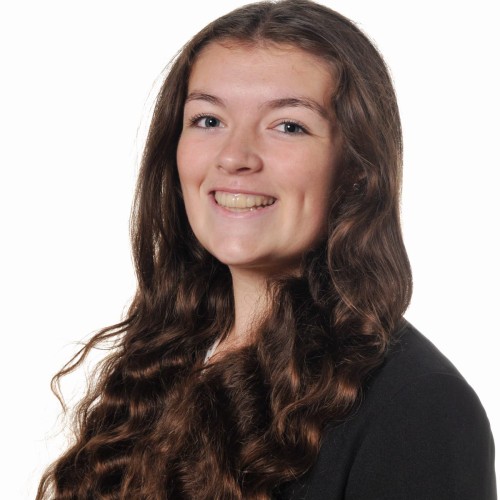
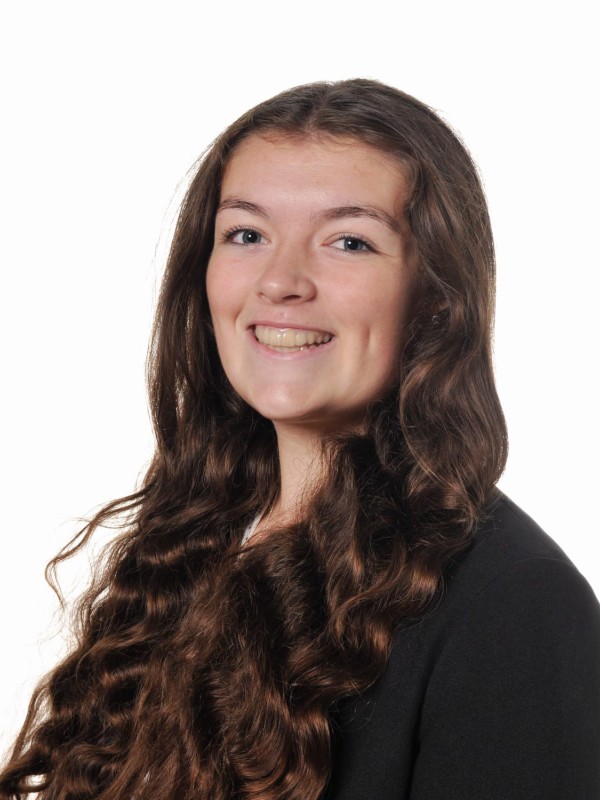
Rachel J.
Student - Mathematics BSc (Hons)
"I think that maths is one of the most enjoyable courses...as it builds on the foundation you learn at A-level and brings new purposes to the knowledge you already have."
Learn more about the qualifications we typically accept to study this course at Surrey.
Typical offer
- BSc (Hons):
- AAB-ABB.
- Required subjects: Mathematics at Grade A
- BSc (Hons) with foundation year:
- CCC.
- Required subjects: Grade C in Mathematics.
Please note: A-level General Studies and A-level Critical Thinking are not accepted. Applicants taking the Science Practical Endorsement are expected to pass.
GCSE or equivalent: English Language at Grade 4 (C).
- BSc (Hons):
- DDD. Additionally, A-level Mathematics grade A.
- BSc (Hons) with foundation year:
- MMM. Additionally, A-level Mathematics grade C.
GCSE or equivalent: English Language at Grade 4 (C).
We can also consider a number of other BTEC qualifications or combinations of A-levels and BTEC qualifications. Please contact the Admissions team, specifying your programme of interest, along with details of your own particular combination of qualifications.
- BSc (Hons):
- 34-33
- Required subjects: Mathematics Applications and Interpretations HL6 or Mathematics Analysis and Approaches HL6/SL7.
- BSc (Hons) with foundation year:
- 29
- Required subjects: Mathematics Analysis and Approaches HL4/SL6 or Mathematics Applications and Interpretations HL4.
GCSE or equivalent: English A HL4/SL4 or English B HL5/SL6.
- BSc (Hons):
- 82%-78%
- Required subjects: Mathematics (5 period) 8.5
- BSc (Hons) with foundation year:
- For foundation year equivalencies please contact the Admissions team.
GCSE or equivalent: English Language (1/2) - 6 or English Language (3) - 7.
- BSc (Hons):
- QAA recognised Access to Higher Education Diploma with 45 level 3 credits overall including 39 at Distinction and 6 at Merit - 30 at Distinction and 15 at Merit. Additionally A-level Mathematics grade A.
- BSc (Hons) with foundation year:
- QAA-recognised Access to Higher Education Diploma with 45 Level 3 credits including 21 Level 3 Credits at Distinction, 3 Level 3 Credits at Merit, 21 Level 3 Credits at Pass. Additionally, A-level Mathematics grade C.
GCSE or equivalent: English Language Grade 4 (C).
- BSc (Hons):
- AAABB-AABBB
- Required subjects: Mathematics at Grade A
- BSc (Hons) with foundation year:
- For foundation year equivalencies please contact the Admissions team.
GCSE or equivalent: Scottish National 5 English Language grade C.
- BSc (Hons):
- AAB-ABB from a combination of the Advanced Skills Baccalaureate Wales and two A-levels.
- Required subjects: A-level Mathematics at grade A.
- BSc (Hons) with foundation year:
- CCC from a combination of the Advanced Skills Baccalaureate Wales and two A-levels.
- Required subjects: A-level Mathematics.
This route is only applicable to the MMath course.
Applicants taking the Extended Project Qualification (EPQ) will receive our standard A-level offer, plus an alternate offer of one A-level grade lower, subject to achieving an A grade in the EPQ. The one grade reduction will not apply to any required subjects.
This grade reduction will not combine with other grade reduction policies, such as contextual admissions policy or In2Surrey.
English language requirements
IELTS Academic: 6.0 overall with 5.5 in each element.
View the other English language qualifications that we accept.
If you do not currently meet the level required for your programme, we offer intensive pre-sessional English language courses, designed to take you to the level of English ability and skill required for your studies here.


International Foundation Year
If you are an international student and you don’t meet the entry requirements for this degree, we offer the International Foundation Year at the Surrey International Study Centre. Upon successful completion, you can progress to this degree course.
Selection process
We normally make offers in terms of grades.
If you are a suitable candidate you will be invited to an offer holder event. During your visit to the University you can find out more about the course and meet staff and students.
Recognition of prior learning
We recognise that many students enter their higher education course with valuable knowledge and skills developed through a range of professional, vocational and community contexts.
If this applies to you, the recognition of prior learning (RPL) process may allow you to join a course without the formal entry requirements or enter your course at a point appropriate to your previous learning and experience.
There are restrictions on RPL for some courses and fees may be payable for certain claims. Please see the code of practice for recognition of prior learning and prior credit: taught programmes (PDF) for further information.
Contextual offers
Did you know eligible students receive support through their application to Surrey, which could include a grade reduction on offer?
Fees
Explore UKCISA’s website for more information if you are unsure whether you are a UK or overseas student. View the list of fees for all undergraduate courses.
Payment schedule
- Students with Tuition Fee Loan: the Student Loans Company pay fees in line with their schedule.
- Students without a Tuition Fee Loan: pay their fees either in full at the beginning of the programme or in two instalments as follows:
- 50% payable 10 days after the invoice date (expected to be early October of each academic year)
- 50% in January of the same academic year.
The exact date(s) will be on invoices. Students on part-time programmes where fees are paid on a modular basis, cannot pay fees by instalment.
- Sponsored students: must provide us with valid sponsorship information that covers the period of study.
Professional training placement fees
Professional Training placement year fees are approximately 20% of the full-time fee for the academic year in which you undertake your placement.
Additional costs
There may be travel costs in order to attend the placement school - approximately £60.
Please note this is only applicable if you take the PHY3063 STEM Education and Public Engagement module.
Scholarships and bursaries
Discover what scholarships and bursaries are available to support your studies.
Our award-winning Professional Training placement scheme gives you the chance to spend a year in industry, either in the UK or abroad.
We have thousands of placement providers to choose from, most of which offer pay. So, become one of our many students who have had their lives and career choices transformed.
Statistics
Placement Statistics
92%
of students who did a placement entered into graduate level employment*
80%
of placements are paid, with 60% paying between £18,000 - £30,000
48%
of our students have been offered a graduate role from their placement provider**
*Graduate Outcomes 2025, HESA
**Professional training year returners survey 2024
Mathematics with data science placements
Mathematicians are in demand across a broad range of industries, in both traditional and emerging fields. This breadth is reflected in the award-winning Professional Training placements that students take as part of their course. Students usually go on placement between Years 2 and 3, but MMath students can go on placement between Years 3 and 4.
You might choose to gain experience in financial services, including banking, insurance, computer programming or logistics. You might even be involved in an internet start-up. Check out our video below to see how Surrey students have thrived on placement, gaining the skills and experience which employers are looking for.
Over the years, we’ve placed students with many big-name companies and organisations both in the UK and abroad including:
- AXA Actuarial
- BAE Systems
- Deloitte
- Department of Transport
- GlaxoSmithKline
- HM Revenue and Customs
- Intel
- Lloyds
- NHS
- Office for National Statistics.
Recent placements
In recent years, our students have placed at:
2024-2025
- Enterprise Mobility
- Liberty Speciality Markets Ltd
- Clarksons
- Blinkhorns
- National Physical Laboratory.
2023-2024
- Defence Science and Technology Laboratory
- Bourne Education Trust
- First Central
- Alderney Marketing Services
- Nugawi Automation Services Limited
- Arriva Rail London.
2022-2023
- St Andrew's Catholic School
- RSA Insurance Group Ltd
- RSM UK
- WorkL
- Pacific Life Re Ltd.
Applying for placements
Students are generally not placed by the University. But we offer support and guidance throughout the process, with access to a vacancy site of placement opportunities.
Find out more about the application process.


Rory's placement at IBM and Wimbledon
Mathematics student, Rory, spent his Professional Training placement at IBM in Hursley, but also went with the team to Wimbledon.
Rory's placement at IBM and Wimbledon
Mathematics student, Rory, spent his Professional Training placement at IBM in Hursley, but also went with the team to Wimbledon.
Study and work abroad
Studying at Surrey opens a world of opportunity. Take advantage of our study and work abroad partnerships, explore the world, and expand your skills for the graduate job market.
The opportunities abroad vary depending on the course, but options include study exchanges, work/research placements, summer programmes, and recent graduate internships. Financial support is available through various grants and bursaries, as well as Student Finance.
Perhaps you would like to volunteer in India or learn about Brazilian business and culture in São Paulo during your summer holidays? With 140+ opportunities in 36+ different countries worldwide, there is something for everyone. Explore your options via our search tool and find out more about our current partner universities and organisations.
Partner institutions
In your second year, you can spend two semesters abroad at one of our partner universities. Students have studied in:
- America
- Australia
- Canada
- China
- Singapore.
Find out more about our international partner institutions.
Apply for your chosen course online through UCAS, with the following course and institution codes.
About the University of Surrey
Need more information?
Contact our Admissions team or talk to a current University of Surrey student online.
- BSc (Hons)View UGB10F0020U
- BSc (Hons) with foundation yearView UGB10F0021U
- BSc (Hons) with placementView UGB10S0021U
- BSc (Hons) with foundation year and placementView UGB10S0021U
Terms and conditions
When you accept an offer to study at the University of Surrey, you are agreeing to follow our policies and procedures, student regulations, and terms and conditions.
We provide these terms and conditions at offer stage and are shown again at registration. You will be asked to accept these terms and conditions when you accept the offer made to you.
View our generic registration terms and conditions (PDF) for the 2025/26 academic year, as a guide on what to expect.
Disclaimer
This online prospectus has been published in advance of the academic year to which it applies.
Whilst we have done everything possible to ensure this information is accurate, some changes may happen between publishing and the start of the course.
It is important to check this website for any updates before you apply for a course with us. Read our full disclaimer.







